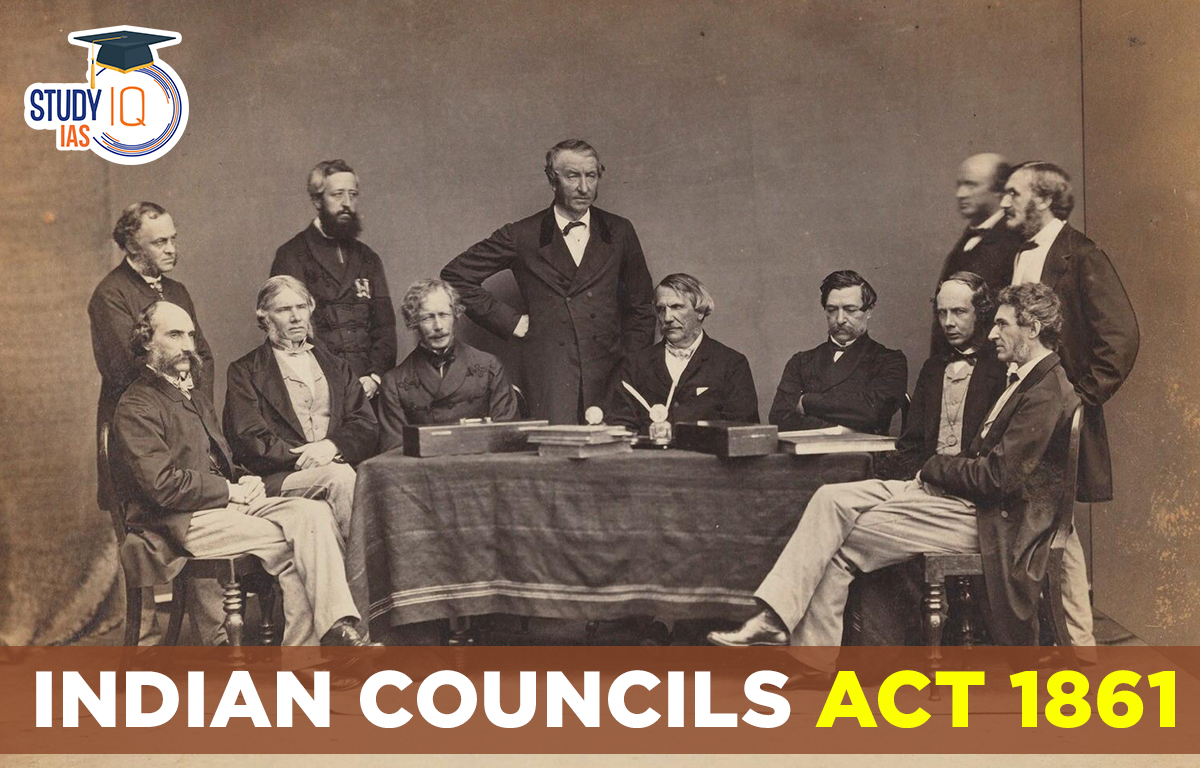Table of Contents
The Indian Councils Act 1861 was an important change in the system of governance in British India, setting the stage for constitutional reforms in the future. Passed on August 1, 1861, this act reconstituted the Governor General’s Council and provided for limited participation by Indians in legislation, early, but regulated, political inclusion under British authority.
Indian Councils Act 1861
The British Parliament approved the Indian Councils Act 1861 on August 1st, changing the makeup of the Governor General’s council for both legislative and executive reasons. This Act’s most notable feature was the involvement of Indians in the legislative process. The Indian Councils Act of 1861 was a significant turning point in India’s political and constitutional history. This article discusses the Indian Councils Act of 1861, which is crucial for UPSC Indian Polity Preparation.
Read about: Pitt’s India Act 1784
Indian Councils Act 1861 History
The Act was born out of the urgent need to restore stability and trust post the 1857 Revolt, also referred to as the First War of Indian Independence.
-
Aftermath of 1857: The violent uprising exposed flaws in British administrative practices and triggered a re-evaluation of governance in India.
-
British Realization: The Crown recognized that co-opting Indian elites and integrating them into governance could help solidify control.
-
Move Towards Reform: The Indian Councils Acts of 1861, 1892, and 1909 formed a series of legislative milestones responding to rising demands for Indian representation.
Read about: Charter Act of 1853
Indian Councils Act of 1861 Reasons for Enactment
The Government of India Act of 1858 made considerable reforms to English-style governance, but it had little impact on the Indian system of government. After the 1857 Mutiny, it was widely believed in England that it would be virtually impossible to form a government in India without Indian involvement in the administration.
The legislative process was centralized by the Charter Act of 1833. It failed to pass legislation that was suited to the requirements of the populace since it had just one representative in each of the four provinces. Due to drawn-out processes that delayed enactment, the Governor General in Council was failing in his legislative duties and unable to perform efficiently.
| Factor | Description |
|---|---|
| Revolt of 1857 | Exposed administrative flaws and called for reforms |
| Power Shift | British Crown needed legal support for its authority |
| Indian Involvement | Aimed at gaining elite support and reducing resentment |
| Decentralization | Better governance through provincial legislative councils |
| Formal Procedures | Separation of legislative and executive functions |
| Imperial Control | Preventing future revolts by creating loyal allies |
| Liberal Ideals | Influence of reforms and liberal governance in Britain |
Key Objectives Behind the Indian Councils Act 1861
-
Rebuild administrative efficiency post-1857 rebellion.
-
Strengthen central control while allowing minimal local participation.
-
Create a structure for limited Indian representation without compromising British supremacy.
-
Decentralize legislation by restoring powers to the Madras and Bombay presidencies.
Key Provisions of the Indian Councils Act 1861
Here are the main provisions of the Act:
| Provision | Description |
|---|---|
| Expansion of the Executive Council | The Governor-General’s Executive Council was expanded by adding 6 to 12 additional members for legislative purposes. These members could be Indians as well. |
| Establishment of Legislative Councils | Legislative Councils were established for the Bombay and Madras Presidencies with the power to make laws for their respective provinces. |
| Restoration of Legislative Powers to Provinces | The Act restored legislative powers to Bombay and Madras that had been centralized earlier in 1833. |
| Inclusion of Indians in Law-Making | For the first time, Indians were nominated to the Legislative Councils. Notably, Raja of Benaras, Maharaja of Patiala, and Sir Dinkar Rao were among the early members. |
| Division of Powers | Separated executive and legislative functions of the Governor-General’s Council. The Legislative Council worked as a mini-Parliament. |
| Power to Make Ordinances | The Governor-General was given the power to issue ordinances in case of emergency, valid for 6 months. |
| Governor-General’s Veto Power | The Governor-General retained the veto power over all legislative proposals. |
| Provision for New Councils | The British Parliament authorized the Governor-General to establish legislative councils for other provinces like Bengal, North-Western Provinces, and Punjab in the future. |
| Restricted Role of Legislative Members | Nominated legislative members could discuss and suggest, but had no control over finances, budgets, or administration. |
| Law-Making Power of the Crown | The British Crown retained the power to disallow or amend any law passed by the Indian Legislative Council. |
Significance of the Indian Councils Act 1861
The Indian Councils Act 1861 was a turning point in the governance of British India. Here’s why:
1. Introduction of Indians into the Legislative Process
-
It marked the beginning of Indian representation in the law-making process, albeit limited.
-
Notable Indians like the Raja of Benaras, the Maharaja of Patiala, and Sir Dinkar Rao were nominated.
2. Foundation for Future Reforms
-
The Act laid the groundwork for further constitutional developments, including the Indian Councils Act 1892 and 1909 (Morley-Minto Reforms).
3. Decentralization
-
The Act acknowledged the need for regional autonomy and granted legislative powers to provinces, a practice that was extended in future acts.
4. Consolidation of British Rule
-
It helped in consolidating British control while appeasing Indian princely states and elites by involving them in governance.
Drawbacks of the Indian Councils Act 1861
Despite being a progressive step for its time, the Act had several limitations:
1. Lack of Real Power to Indians
-
The Indian members had no voting power or say in crucial matters.
-
Their participation was largely advisory and ceremonial.
2. Governor-General’s Dominance
-
The Governor-General retained ultimate authority, including veto power and the ability to override council decisions.
3. Limited Scope of the Legislative Councils
-
The councils were restricted to discussing laws; they could not question the executive or discuss budgets.
4. No Democratic Representation
-
Members were nominated, not elected.
-
This undermined any sense of democratic legitimacy or mass participation.
5. Ordinance Power Abused
-
The ordinance-making power of the Governor-General allowed the bypassing of legislative processes, centralizing power further.
Indian Councils Act of 1861 UPSC
A major turning point in India’s political and constitutional history is the Indian Councils Act of 1861. For executive and legislative reasons, it changed the makeup of the Governor General’s Council. The most remarkable aspect of this Act was the participation of Indians in the legislative process. Representative institutions saw a new beginning when Indians were included in the legislative process. It called for the creation of legislative councils in Bengal, Punjab, and the North-Western Frontier Province. This article has all the details about the Indian Councils Act 1861 for UPSC Exam Preparations.


 Admiralty (Jurisdiction and Settlement o...
Admiralty (Jurisdiction and Settlement o...
 Enemy Property Act in India, Background ...
Enemy Property Act in India, Background ...
 Phone-tapping in India, Legal Framework ...
Phone-tapping in India, Legal Framework ...





















